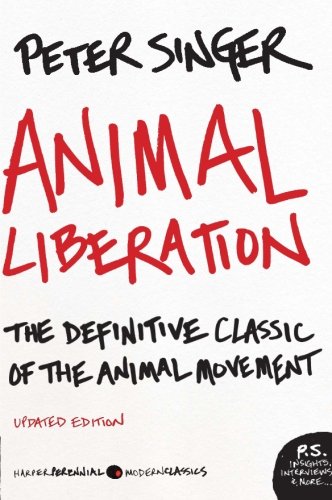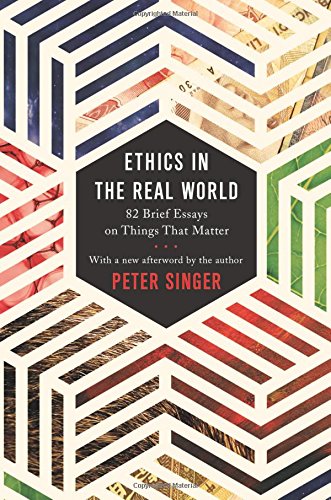Background
Peter Singer was born on July 6, 1946 in Melbourne, Australia after his Viennese Jewish parents immigrated to Australia.



( Since its original publication in 1975, this groundbrea...)
Since its original publication in 1975, this groundbreaking work has awakened millions of people to the existence of "speciesism"our systematic disregard of nonhuman animalsinspiring a worldwide movement to transform our attitudes to animals and eliminate the cruelty we inflict on them. In Animal Liberation, author Peter Singer exposes the chilling realities of today's "factory farms" and product-testing proceduresdestroying the spurious justifications behind them, and offering alternatives to what has become a profound environmental and social as well as moral issue. An important and persuasive appeal to conscience, fairness, decency, and justice, it is essential reading for the supporter and the skeptic alike.
http://www.amazon.com/gp/product/0061711306/?tag=2022091-20

( Peter Singer is often described as the world's most inf...)
Peter Singer is often described as the world's most influential philosopher. He is also one of its most controversial. The author of important books such as Animal Liberation, Practical Ethics, Rethinking Life and Death, and The Life You Can Save, he helped launch the animal rights and effective altruism movements and contributed to the development of bioethics. Now, in Ethics in the Real World, Singer shows that he is also a master at dissecting important current events in a few hundred words. In this book of brief essays, he applies his controversial ways of thinking to issues like climate change, extreme poverty, animals, abortion, euthanasia, human genetic selection, sports doping, the sale of kidneys, the ethics of high-priced art, and ways of increasing happiness. Singer asks whether chimpanzees are people, smoking should be outlawed, or consensual sex between adult siblings should be decriminalized, and he reiterates his case against the idea that all human life is sacred, applying his arguments to some recent cases in the news. In addition, he explores, in an easily accessible form, some of the deepest philosophical questions, such as whether anything really matters and what is the value of the pale blue dot that is our planet. The collection also includes some more personal reflections, like Singers thoughts on one of his favorite activities, surfing, and an unusual suggestion for starting a family conversation over a holiday feast. Now with a new afterword by the author, this provocative and original book will challenge?and possibly change?your beliefs about many real-world ethical questions.
http://www.amazon.com/gp/product/069117847X/?tag=2022091-20
Peter Singer was born on July 6, 1946 in Melbourne, Australia after his Viennese Jewish parents immigrated to Australia.
To attain formal education, Singer attended Preshil School and Scotch College. He did his BA degree from the University of Melbourne in law, history and philosophy in 1967 and completed his MA from the same university in 1969.
He went to the University of Oxford on a scholarship and earned his B. Phil in 1971.
Singer published an article in 1971, ‘Famine, Affluence and Morality’, one of his most famous philosophical essays. In the essay, he has discussed how and why people should make charities and save the people who are dying of starvation.
In 1975, Singers’ book ‘Animal Liberation’ came out in which he talked about animal welfare and how we practice ‘speciesism’ in our modern culture. In his book he supported the concept of vegetarianism and veganism.
During the same time, he was appointed as a Radcliffe lecturer at University College, Oxford and was also an active visiting faculty at the New York University. He went back to Melbourne after some time and spent most of his literary career there.
From 1976-1981, Singer published works like: ‘Animal Rights and Human Obligations: An Anthology’ (1976), ‘Practical Ethics’ (1979), ‘Marx: A Very Short Introduction’ (1980), ‘Animal Factories’ (1980), ‘The Expanding Circle: Ethics and Sociobiology’ (1981).
He was made the chair of philosophy at the Monash University in 1977, where he also became the first director of the Centre for Human Bioethics. Later, he founded the International Association of Bioethics.
From 1982–1985, his published work included: ‘Hegel’ (1982), ‘Test-Tube Babies: a guide to moral questions, present techniques and future possibilities’ (1982), ‘The Reproduction Revolution: New Ways of Making Babies’ (1985) , and ‘Should the Baby Live?: The Problem of Handicapped Infants’.
Some of his major writings during the period 1986–1995 include: ‘Ethical and Legal Issues in Guardianship Options for Intellectually Disadvantaged People’ (1986), ‘Animal Liberation: A Graphic Guide’ (1987), ‘A Companion to Ethics’ (1991), ‘Save the Animals!’ (1991), ‘Embryo Experimentation’ (1993), and ‘The Great Ape Project: Equality Beyond Humanity’ (1995).
In 1993, Singer came out with his ‘How Are We to Live? : Ethics in an Age of Self-Interest’. The book goes through history of ethical thought and discusses the selfishness and the meaning of living life ethically and applying it to daily life.
In 1996, he ran as a Green candidate for the Australian Senate but was unsuccessful. Also, around that time he wrote ‘Rethinking Life and Death: The Collapse of Our Traditional Ethics’, ‘The Greens’, ‘The Allocation of Health Care Resources’, etc.
In 1999, Singer was appointed as the Professor of Bioethics, University Centre for Human Value, Princeton University but due to his stand on bioethical issues, he was considered controversial in American, therefore his appointment had to be justified at the time.
In 2000, Peter's book ‘A Darwinian Left: Politics, Evolution and Cooperation’ was published. In this a book he argued that the evolutionary psychology is attuned with and should be integrated into the left ideological structure.
In 2004, he was recognized as the Australian humanist of the year by the Council of Australian Humanist Societies in 2004. His writings during this time were: ‘Unsanctifying Human Life’, ‘How Ethical is Australia? : An Examination of Australia’s Record as a Global Citizen’, etc.
In 2008, he became a part of the film and book ‘Examined Life: Excursions with Contemporary Thinkers’. The movie featured eight philosophers and was directed by Astra Taylor. Singer talked about ethics from Fifth Avenue, New York City.
In 2009, he wrote and published ‘The Life You Can Save: Acting Now to End World Poverty’. In the book he discussed the growing world poverty when for the first time in humanity we have the finances the and material to eradicate it completely.
In 1979, Singer published ‘Practical Ethics’, which is considered as one of his most wide-ranged works. He has discussed the various interests of the livings beings in details and the quality of a human being to invariably avoid pain.
‘How Are We to Live?: Ethics in an Age of Self-Interest’ published in 1993 is amongst Singer’s popular philosophical writings, delving into the quest of finding a reasonable ethical structure in today’s scenario.
In 2009, ‘The Life You Can Save: Acting Now to End World Poverty’ became one of his most comprehensive humanitarian writings, discussing the immorality of today’s generation in not coming together and eradicating poverty.
( Since its original publication in 1975, this groundbrea...)
( Peter Singer is often described as the world's most inf...)
Vienna Psychoanalytic Society, Animal Charity Evaluators, Green Party of Victoria
Since 1968 Peter Albert David Singer has been married to Renata Singer. They have three children.
